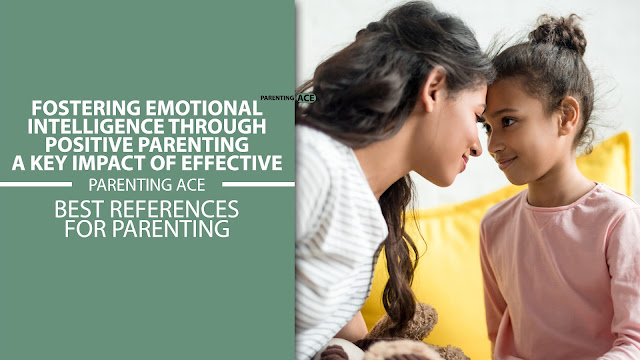Nurturing Emotional Intelligence Through Positive Parenting: A Key Impact of Effective Parenting Practices
In the intricate tapestry of parenting, one thread stands out as particularly transformative: emotional intelligence. Emotional intelligence, the ability to recognize, understand, and manage emotions effectively, is not only a vital life skill but also a cornerstone of positive parenting practices. In this blog post, we embark on a journey to explore the profound impact of emotional intelligence on children's development and how positive parenting techniques serve as the key to unlocking its full potential. Join us as we delve into the intricate interplay between emotional intelligence and effective parenting, uncovering strategies to nurture this invaluable trait in our children and empower them to thrive in an increasingly complex world.
 |
| Fostering Emotional Intelligence Through Positive Parenting: A Key Impact of Effective Practices |
Emotional intelligence (EI) stands as a cornerstone of personal development, influencing how individuals perceive, understand, and manage their own emotions, as well as those of others. In the context of parenting, cultivating emotional intelligence in children is paramount, as it significantly impacts their overall well-being and success in life. This article delves into the profound connection between emotional intelligence and positive parenting practices, highlighting its crucial role in shaping the impact of parenting on children.
Understanding Emotional Intelligence
Emotional intelligence encompasses a set of skills that enable individuals to recognize, understand, and regulate their emotions effectively. These skills include self-awareness, self-regulation, social awareness, and relationship management. Research suggests that individuals with higher levels of emotional intelligence tend to have better mental health, stronger interpersonal relationships, and greater resilience in facing life's challenges.
The Role of Positive Parenting Practices
Positive parenting practices play a pivotal role in nurturing emotional intelligence in children. By providing a supportive and nurturing environment, parents can help children develop a strong sense of self-awareness and emotional regulation. Positive parenting involves fostering open communication, empathetic listening, and validation of children's emotions, which empowers them to express themselves authentically and manage their feelings effectively.
Building Self-Awareness
One of the fundamental aspects of emotional intelligence is self-awareness, which involves recognizing and understanding one's own emotions. Through positive parenting practices such as encouraging self-expression and reflection, parents can help children develop a deeper understanding of their emotions, preferences, and values. By validating children's feelings and experiences, parents foster a sense of self-worth and acceptance, laying the foundation for healthy emotional development.
Promoting Self-Regulation
Emotional regulation is another crucial component of emotional intelligence, enabling individuals to manage their emotions in constructive ways. Positive parenting practices such as modeling calm and adaptive responses to stress, providing strategies for coping with difficult emotions, and setting clear boundaries help children learn to regulate their emotions effectively. By teaching children how to identify triggers, recognize their emotional state, and choose appropriate responses, parents empower them to navigate life's challenges with resilience and confidence.
Enhancing Social Awareness and Relationship Management
In addition to self-awareness and self-regulation, emotional intelligence involves social awareness and relationship management skills. Positive parenting practices such as encouraging empathy, teaching perspective-taking, and promoting cooperative problem-solving foster children's ability to understand and connect with others. By modeling positive communication, conflict resolution, and respect for diversity, parents equip children with the skills they need to build healthy and meaningful relationships throughout their lives.
In conclusion, nurturing emotional intelligence through positive parenting practices is essential for supporting children's overall development and well-being. By fostering self-awareness, self-regulation, social awareness, and relationship management skills, parents lay the groundwork for their children to thrive emotionally, socially, and academically. As parents strive to cultivate emotional intelligence in their children, they contribute to creating a future generation capable of navigating life's challenges with empathy, resilience, and compassion.




